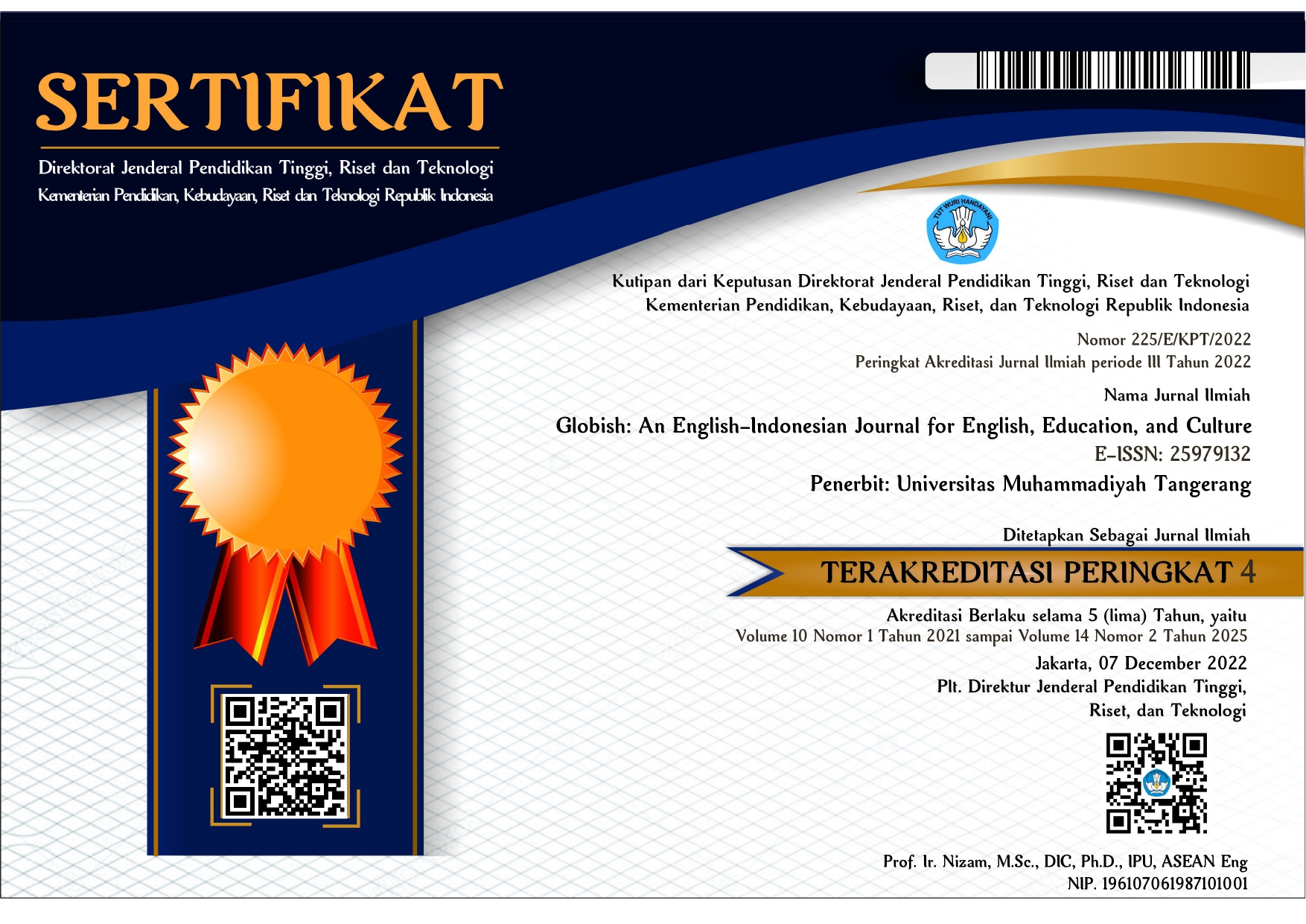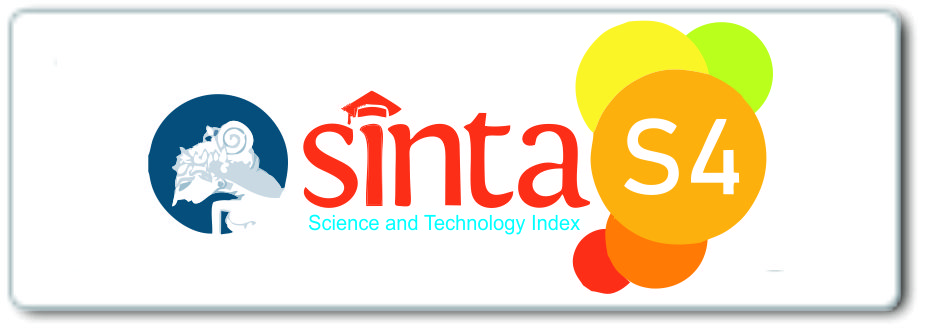THE USE OF MICROSOFT TEAMS AS AN ONLINE PLATFORM IN ELT CLASSROOM DURING THE PANDEMIC: STUDENTS’ PERCEPTION
Abstract
Keywords
Full Text:
PDFReferences
Agustina, E., & Cahyono, B. Y. (2017). Perceptions of Indonesian Teachers and Students on the Use of Quipper School as an Online Platform for Extended EFL Learning. Journal of Language Teaching and Research, 8(4), 794. https://doi.org/10.17507/jltr.0804.20
Aini, Z., Muslem, A., & Marhaban, S. (2021). Investigating students’ motivation and problems toward the use of Zoom platform in English teaching and learning process during the Covid-19 pandemic. English Education Journal, 12(4), 613–630. https://doi.org/10.24815/eej.v12i4.21213
Aisyah, S. (2021). Dampak Psikologis Pembelajaran Daring Pada Masa Pandemi Di Min 1 Sumenep. Jurnal Pusaka, 11(2), 53–61. https://doi.org/10.35897/ps.v11i2.655
Bandung:, Sugiyono.Alfabeta, C. 2017. (2017). Metode Penelitian Kuantitatif, Kualitatif, dan R&D. Alfabeta.
Goodyear, P. (2004). Advances in Research on Networked Learning. In Advances in Research on Networked Learning. Dor-drecht: Kluwer Academic Publishers. https://doi.org/10.1007/1-4020-7909-5
Irfan, M., Kusumaningrum, B., Yulia, Y., & Widodo, S. A. (2020). Challenges During the Pandemic: Use of E-Learning in Mathematics Learning in Higher Education. Infinity Journal, 9(2), 147. https://doi.org/10.22460/infinity.v9i2.p147-158
Mulenga, E. M., & Marbán, J. M. (2020). Prospective teachers’ online learning mathematics activities in the age of COVID-19: A cluster analysis approach. Eurasia Journal of Mathematics, Science and Technology Education, 16(9). https://doi.org/10.29333/EJMSTE/8345
Namachivayam, A. (2021). An Appraisal of Microsoft Teams and Its Features. ResearchGate, November, 462–478.
Nancy M. Lorenzi and Robert T. Riley. (2000). Managing Change: An Overview. Journal of the American Medical Informatics Association.
Oviera Maulia Gossti. (2016). Students’ Perception Towards The Use of Online Homework to Increase Their Motivation. Program Studi Pendidikan Bahasa Inggris FBS-UKSW.
Phan, T. T. N., & Huynh, D. T. N. (2021). Improving Non-Majored Students’ Fluency in the English Speaking Skill in the Online Environment via Ms-Team. Proceedings of the 17th International Conference of the Asia Association of Computer-Assisted Language Learning (AsiaCALL 2021), 533. https://doi.org/10.2991/assehr.k.210226.012
Pianta, R. C., Belsky, J., Vandergrift, N., Houts, R., & Morrison, F. J. (2008). Classroom effects on children’s achievement trajectories in elementary school. American Educational Research Journal, 45(2), 365–397. https://doi.org/10.3102/0002831207308230
Rahardjo, A., & Pertiwi, S. (2020). Learning Motivation and Students’ Achievement in Learning English. Journal of English Language Teaching and Literature, 01(02), 56–64.
Rismiyanto, & Suryani, F. B. (2021). The Best Microteaching Practice Platform: Offline , Zoom , or Whatsapp Group ? Prominent: Journal of English Studies, 4(2), 81–87.
Rojabi, A. R. (2020). Exploring EFL Students’ Perception of Online Learning via Microsoft Teams: University Level in Indonesia. English Language Teaching Educational Journal, 3(2), 163. https://doi.org/10.12928/eltej.v3i2.2349
Samah Zakareya Ahmad. (2016). The Flipped Classroom Model to Develop Egyptian EFL Students’ Listening Comprehension. English Language Teaching.
Titthasiri, W. (2013). A Comparison of E-Learning and Traditional Learning: Experimental Approach. International Journal of Information Technology & Computer Science ( IJITCS ) ), 12(3), 67–74. http://www.ijitcs.com
Vali Ilie, E. S. F. (2019). TRADITIONAL LEARNING VERSUS E-LEARNING. EduWorld 2018 - 8th International Conference.
van de Pol, J., Volman, M., & Beishuizen, J. (2010). Scaffolding in teacher-student interaction: A decade of research. Educational Psychology Review, 22(3), 271–296. https://doi.org/10.1007/s10648-010-9127-6
Yuzulia, I. (2021). The Challenges of Online Learning during Pandemic: Students’ Voice. Wanastra: Jurnal Bahasa Dan Sastra, 13(1), 08–12. https://doi.org/10.31294/w.v13i1.9759
DOI: http://dx.doi.org/10.31000/globish.v11i2.6462
Article Metrics
Abstract - 1594 PDF - 741Refbacks
- There are currently no refbacks.
Globish
Program Studi Pendidikan Bahasa Inggris
Fakultas Keguruan dan Ilmu Pendidikan
Universitas Muhammadiyah Tangerang
Jl. Perintis Kemerdekaan I/33, Cikokol
Kota Tangerang, Indonesia
e-mail: globish_journal@umt.ac.id
Globish (p-ISSN: 2301-9913 | e-ISSN: 2301-9913) is licensed under a Creative Commons Attribution-ShareAlike 4.0 International License.









